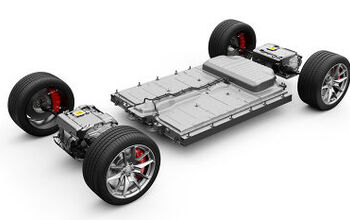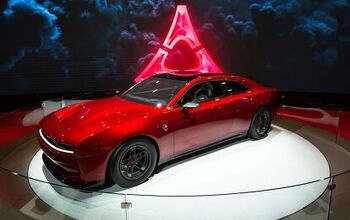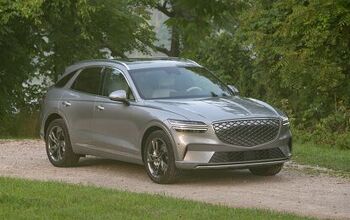Does France Hate Speed Cameras More Than America Loves The El Camino?
Today’s sign of the times comes courtesy of the world of social media, and calls into question some of our most basic assumptions about the world of cars. France, it seems, experienced a 12.8% increase in on-road fatalities in the first quarter of this year, and the New York Times reports that the French government is responding by banning devices that scan the road ahead for speed camera radar waves.
A decade ago, the death rate on French roads was among the worst in Europe, and the government reacted in 2002 with what some drivers called repressive tactics. Radar cameras were erected at intersections throughout the country, which captured a motorist’s license plate if the car surpassed the speed limit by more than 5 kilometers an hour (3 m.p.h.), deducted points off a motorist’s license and sent a fine through the mail.
The measures were deemed successful. The International Transport Forum said France achieved a reduction of 47 percent in its road-death toll in the first decade of the century, relative to the 1990s. The ministerial report said the average speed in France also dropped 10 kilometers an hour since 2002, or 11.7 percent.
The radar cameras, however, spawned a thriving market in radar-warning devices. According to AFFTAC, 5.1 million drivers in France use them. Under the new law, users would face fines of up to 1,500 euros, or about $2,100.
The French government’s decision to not only ban radar detectors, but also to remove signs warning motorists of fixed radar cameras has generated some serious backlash. Apparently over 80,000 people “liked” the Facebook page of AFFTAC, a group opposing the measures and calling for nationwide protests, over the course of two days. By comparison, the most optimistic count of hand-raisers for a possible future Chevy El Camino is “possibly as high as 18,000 people.” Call us crazy, but we thought America’s oft-cited “love affair with the automobile” would have created some slightly different results.
More by Edward Niedermeyer
Latest Car Reviews
Read moreLatest Product Reviews
Read moreRecent Comments
- Analoggrotto Does anyone seriously listen to this?
- Thomas Same here....but keep in mind that EVs are already much more efficient than ICE vehicles. They need to catch up in all the other areas you mentioned.
- Analoggrotto It's great to see TTAC kicking up the best for their #1 corporate sponsor. Keep up the good work guys.
- John66ny Title about self driving cars, linked podcast about headlight restoration. Some relationship?
- Jeff JMII--If I did not get my Maverick my next choice was a Santa Cruz. They are different but then they are both compact pickups the only real compact pickups on the market. I am glad to hear that the Santa Cruz will have knobs and buttons on it for 2025 it would be good if they offered a hybrid as well. When I looked at both trucks it was less about brand loyalty and more about price, size, and features. I have owned 2 gm made trucks in the past and liked both but gm does not make a true compact truck and neither does Ram, Toyota, or Nissan. The Maverick was the only Ford product that I wanted. If I wanted a larger truck I would have kept either my 99 S-10 extended cab with a 2.2 I-4 5 speed or my 08 Isuzu I-370 4 x 4 with the 3.7 I-5, tow package, heated leather seats, and other niceties and it road like a luxury vehicle. I believe the demand is there for other manufacturers to make compact pickups. The proposed hybrid Toyota Stout would be a great truck. Subaru has experience making small trucks and they could make a very competitive compact truck and Subaru has a great all wheel drive system. Chevy has a great compact pickup offered in South America called the Montana which gm could make in North America and offered in the US and Canada. Ram has a great little compact truck offered in South America as well. Compact trucks are a great vehicle for those who want an open bed for hauling but what a smaller more affordable efficient practical vehicle.

































Comments
Join the conversation
As previously stated by virages, some points of this note need to be corrected. First of all, radar detectors in the traditional US sense (radar or laser waves detectors) are banned in France for as long as I can remember, with a law that is both severe and severely enforced. As a result they are marginal in the drivers' landscape. But the consequence is that we were among the first to see the potential offered by the combination of GPS data, 3G networks and real-time information by users, and we had the first company developing it, called Coyote, born 2005. It should be noted that one of France's neighbours, Switzerland, has even banned GPS devices able to connect to a fixed radars database, including of course the most efficient ones using 3G. This law is of course unenforced as radars are just POIs in these devices, but the real-time aspect is effectively prevented from working. Any way, no such thing as a mere technicality can prevent our governments (I'm French living in Switzerland, that makes two governments to deal with) from legislating and reducing our freedom of speech, which would be too greatly helped by progress in IT.
> Call us crazy, but we thought America’s oft-cited “love affair with the automobile” would have created some slightly different results. ...or have we become a nation of apathetic reactionaries?